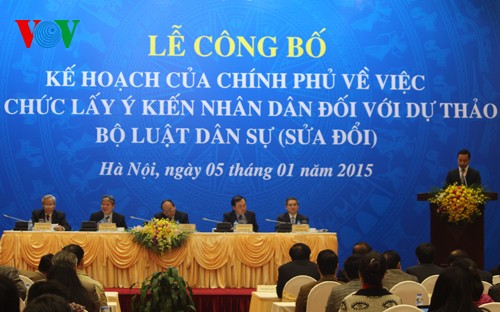(VOVworld) – A referendum on revisions to the Civil Code is being held for 3 months. The revised Civil Code will be a key law in the legal system which regulates almost all social relations based on the principles of freedom, free will, equality, and self-responsibility.

The government announces a public poll on the draft revisions to the Civil Code |
The revised Civil Code consists of 710 articles. It keeps 265 articles of the 2005 Civil Code, adds 174 articles, revises 298 articles, and removes 147 articles. The public poll on the revised Civil Code will focus on the responsibility of authorized agencies in protecting civil rights, personal rights, entities of civil relations, prescription of inheritance, and forms of ownership.
A basic law in Vietnam’s legal system
The Civil Code regulates many other laws and civil exchanges in society. The Civil Code regulates the basic principles of civil law, legal status, legal standards of personal behaviors and legal entity, personal rights and obligations and personal assets, legal entity in civil relations, marriage and family, business, trade, labor, and other relations on the basis of equality, free will, property independence, and self-responsibility. Lawyer Nguyen Trong Ty, former President of the Ho Chi Minh City Bar Association, said: “The Civil Code is the most important law in Vietnam’s legal system. After the Constitution, all citizen rights are defined in the Civil Code. The rights of each individual and organization are defined in the Civil Code. We appreciate the revisions to the Civil Code to match the Constitution.”
Several supplements to meet practical demand
The referendum covers the responsibility of authorized agencies in protecting civil rights, personal rights, legal entity in civil relations, and forms of ownership. Deputy Prime Minister Nguyen Xuan Phuc said: “The Civil Code must be the basis of the legal system to regulate civil relations. The Civil Code should meet the requirements of the socialist-oriented market economy. It has to inherit Vietnamese legal regulations, refer to foreign Civil Laws, and reflect reality.”
The revised Civil Code will take the equality of civil entities as the criteria to define the scope of adjustments; fine tuning the Constitution’s contents on acknowledging, respecting, protecting, and ensuring human and citizen rights.
Regarding the responsibilities of authorized agencies in charge of protecting civil rights, the revised Civil Code says the court is not allowed to refuse a civil case because there are no applicable regulations.
The revised Civil Code stipulates the legal protection of personal privacy, the right of association, the right to access information, and the right to live. Lawyer Nguyen Trong Ty again: “In this Civil Code, the government pays particular attention to citizens’ real rights in accordance with citizens’ rights and obligations stated right in the Chapter 2 of the 2013 Constitution. Ownership is considered the most important right for citizens in addition to other rights including political rights, voting rights, rights to join and supervise state organizations.”
Property and ownership are considered key contents in the revised Civil Code while new amendments will be made to other contents regarding civil obligation and contracts. The draft Civil Code regulates that there are two kinds of properties: real estate and movables to ensure civil rights for individuals and legal entities; minimizing civil authorities’ intervention into establishing, changing, or ending civil relations; and facilitating business production and utilizing effectively social resources. Movables may be money and valuable objects and papers and property rights including intellectual rights. Information regarding registered properties must be made public.
Amendments and supplements to the Civil Code are of great importance to make it practical and effective for Vietnam’s development and international integration in the new context.